A Quick Guide to Countertops
February 22nd, 2024 | by Madison Stone
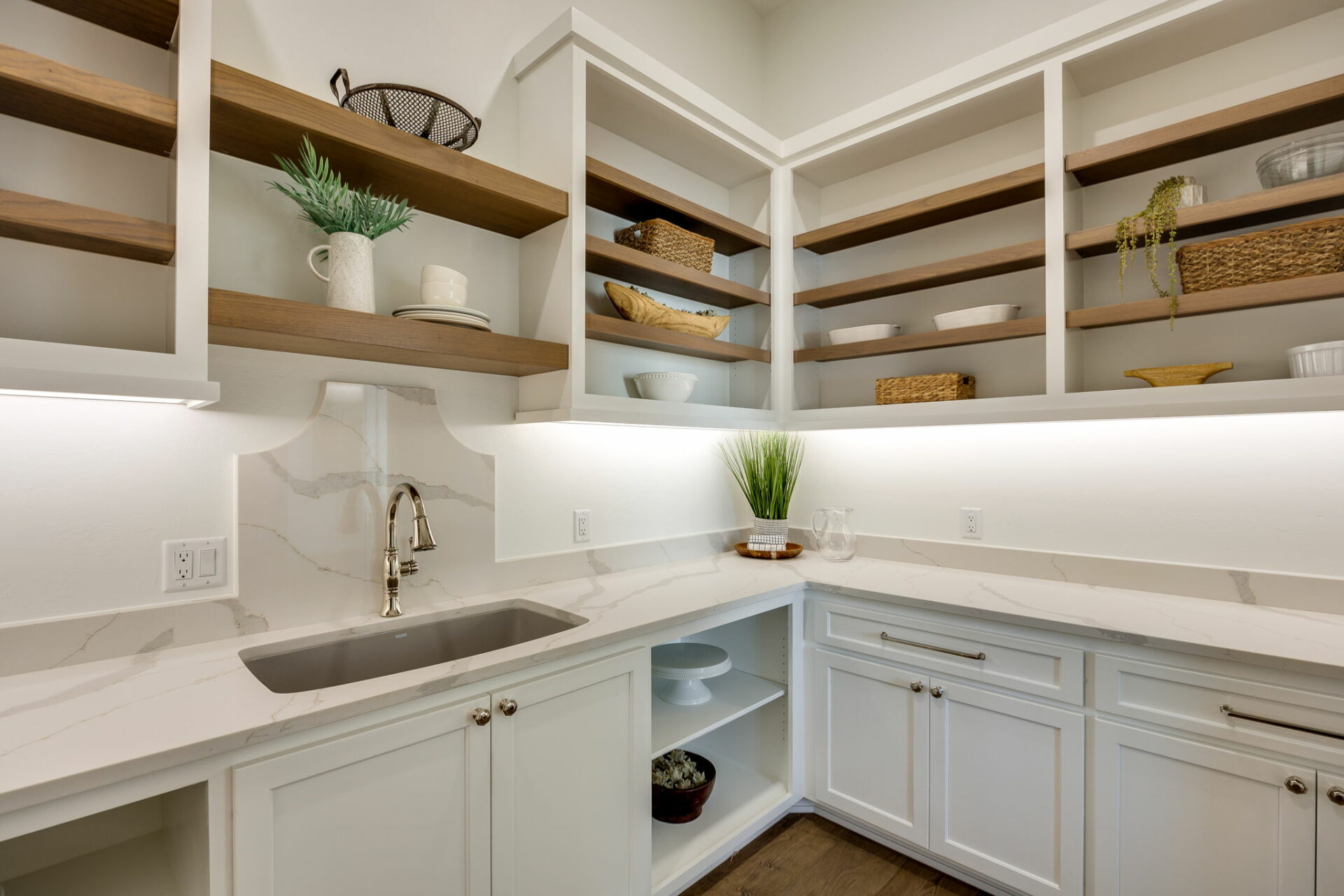
Pete & Co. – A Quick Guide to Countertops
One question we often get here at Stonewall Homes is what type of countertop is best for creating a functional yet low-maintenance and beautiful kitchen. The answer we typically give is that there’s really no right answer—often, choosing a countertop depends on personal preference, style, and budget.
That being said, it is prudent to be familiar with the pros and cons of the different types of countertops out there to make an informed decision. For example, many natural stone surfaces are similar in strength, but differences in porousness lend to different methods of maintenance.
So, here’s our quick guide to choosing a countertop that’s perfect for you and your home.
Q: What are the standard types of countertops?
A:
Granite

Granite is an extremely tough yet expensive option for countertops. It is scratch resistant and heat resistant (a golden combination), and because granite is found naturally each slab is unique and attractive in its own way. The only drawbacks to granite is its price and required level of maintenance—it’s a heavy, hard-to-install, and tough material, and it must be sealed often.
Maintenance: As stated above, granite has to be sealed every three to five years to counter staining and discoloration, which can happen easily. However, the material is easy to clean in day-to-day life—simply wipe it down with a cloth and soapy water.
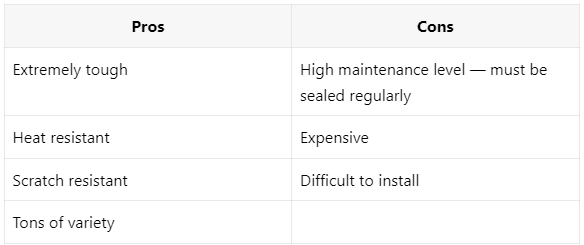
.
Quartz

One of the most durable, easy to maintain countertops is quartz, making it one of the most popular choices in high traffic kitchens. Quartz is a manmade mixture of about 90% quartz mixed with other minerals to form a surface that is strong and sturdy—but not heat resistant. If there’s one thing to know about quartz, it is its susceptibility to heat.
Maintenance: Quartz does not need to be sealed like other countertops as it’s a non-porous material. To clean, simply wipe down with soap and a soft cloth.
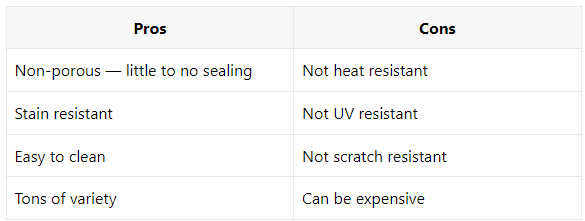
.
Note: Despite having similar names, quartz is not the same as quartzite, which is a natural stone. Quartzite can be used as countertops and often is given that it’s even more durable than quartz and heat resistant to boot. Because of this, however, quartzite is a more expensive option. To learn more about quartzite and how it differs from quartz, check out this article.
.
Marble

Marble is certainly one of the trendiest choices in countertops, but it is also easily the most expensive in this list. While endeared for its gorgeous colors and natural veining, marble is also relatively tough—it’s resistant to heat and chipping. However, marble is porous and must be sealed annually to ward off stains, and it is susceptible to scratching.
Maintenance: Seal once annually. Be diligent to wipe up spills, especially ones high in acidity such as tomato juice or wine. Use a soft cloth and gentle soap to clean.
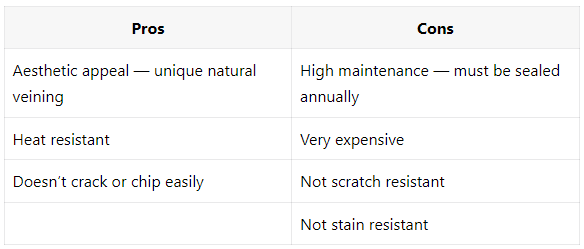
.
Butcher Block

Crafted from multiple pieces of wood, butcher block countertops are often used as focal points in pantries or on kitchen islands. They are a beautiful, organic alternative to stone, and a large variety of wood types and colors to choose from guarantees that no two butcher blocks are the same. The obvious drawback is that wood is not as resistant to wear as stone—butcher blocks can scratch and stain fairly easily.
Maintenance: Because wood is fibrous and porous, butcher block countertops must be oiled (and sometimes sanded) every two to three years. Spills should be wiped up quickly with a soft cloth and soap to avoid staining.
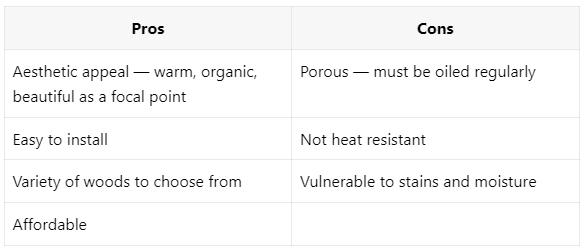
.
Concrete

Less popular but still very trendy are concrete countertops. Concrete is an extremely durable option given its resistance to scratching and chipping. They’re also highly customizable—concrete can be textured, stamped, or colored, and, because they’re often poured on-site, can be formed in unique ways. Because they are cumbersome to install, concrete countertops are more on the expensive side, and the natural settling of a house or heavy weight can lead to cracking. Because of this, concrete can be a bit of a gamble when it comes to longevity.
Maintenance: Concrete must be sealed or waxed regularly, and spills should be cleaned quickly since it can stain so easily and is vulnerable to moisture. Wipe with a rag and soap to clean.
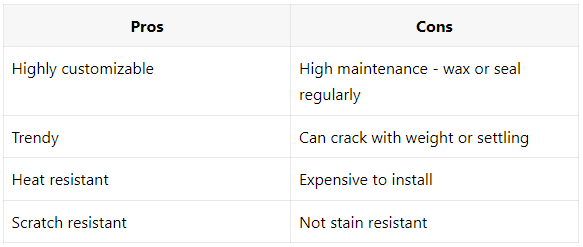
.
Q: What are the differences between honed, polished, and leathered finishes?
A: Most natural stone countertops you come in contact with have either a honed or polished finish. A polished countertop, as the name suggests, is simply one that’s been polished to a smooth, luxurious shine. A honed surface has a matte or satin finish but is no less smooth.
Besides aesthetics, the main difference between the two lies in durability. Honed finishes require more upkeep (they should be sealed annually or biennially) and stain easier as the honing process opens up micro-pores in the material. In comparison, polished surfaces only need to be sealed every five or so years and are not as porous; however, they are definitely more prone to scratching than any other type of finish.

.
Then, there are leathered countertops. Leathering is a process (often used on granite or quartz) in which an already honed surface is brushed with a diamond-tipped brush to create contours in the stone. While this finish has been more popular in outdoor settings given its rugged look and texturing, leathered countertops have been creeping their way into more and more indoor kitchens and pantries.
This is for good reason—they require less maintenance than either polished or honed surfaces, they don’t stain easily, and their unique texturing draws the eye in the best way while also managing to hide imperfections. The biggest drawback is that crumbs and spills will inevitably settle into the surfaces’ crevices and crannies, so everyday clean-up might become a bit more of a chore. Given that extra steps are taken to create it, this finish is also more costly than the other two.
.
Q: Where does Stonewall Homes get our countertops?
A: We’re glad you asked. We primarily use Metro Granite for our all of our (many) countertop needs. Check them out here!
We’re open to working with other suppliers if requested by our clients, but we can’t recommend Metro Granite enough—we’ve worked with them for years, so they’re thoroughly vetted, and they always take great care of our homeowners.

.
Q: What kind of countertop should I get for my home?
A: Like we said before, it comes down to personal preference—make sure to check out the pros and cons above, weigh all of the options, ask the experts, etc.
Also, sometimes just having the opportunity to look at different options and styles makes all the difference. Check out our gallery of past projects to see what catches your eye and go from there!
